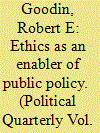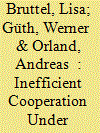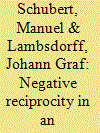| Srl | Item |
| 1 |
ID:
153300


|
|
|
|
|
| Summary/Abstract |
Ethics constrains us. But ethics can also act as an ‘enabler’, helping to secure compliance with public policies. Basing policies on ethical principles helps the public know what is required of them by public policies. Framing policies in those ways also primes people to think in terms of their own ethically based reasons for action. Basing policies on ethical principles can assist in securing the cooperation of potential veto players by creating cooperative norms and a culture of trust.
|
|
|
|
|
|
|
|
|
|
|
|
|
|
|
|
| 2 |
ID:
186326


|
|
|
|
|
| Summary/Abstract |
Stochastic uncertainty can cause coordination problems that may hinder mutually beneficial cooperation. We propose a mechanism of ex-post voluntary transfers designed to circumvent these coordination problems and ask whether it can increase efficiency. To test this transfer mechanism, we implement a controlled laboratory experiment based on a repeated Ultimatum Game with a stochastic endowment. Contrary to our hypothesis, we find that allowing voluntary transfers does not lead to an efficiency increase. We suggest and analyze two major reasons for this failure: first, stochastic uncertainty forces proposers intending to cooperate to accept high strategic uncertainty, which many proposers avoid; second, many responders behave only incompletely conditionally cooperatively, which hinders cooperation in future periods.
|
|
|
|
|
|
|
|
|
|
|
|
|
|
|
|
| 3 |
ID:
132316


|
|
|
|
|
| Publication |
2014.
|
| Summary/Abstract |
How is negative reciprocity cultivated in an environment of violent conflict? This study investigates how students in the West Bank react to unfair proposals in an ultimatum game. Proposals submitted with Hebrew as compared to Arab handwriting are rejected more often. Israelis must offer 15 percent more of a given stake than Palestinians in order to achieve the same probability of acceptance. This willingness to lose money by rejecting proposals reveals a preference for discrimination against Israelis, cultivated in the conflict-ridden environment. Students who voice a militant attitude, surprisingly, do not reveal a higher tendency to discriminate, exercising a high degree of negative reciprocity toward all unfair proposals. But those who favor a political role for Islam have a higher inclination to discriminate. This implies that ethnic and religious cleavages do not consistently generate in-group solidarity.
|
|
|
|
|
|
|
|
|
|
|
|
|
|
|
|